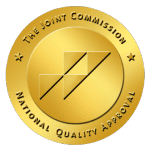 Accredited by the Joint Commission
Accredited by the Joint Commission
For members of the public who have questions or concerns regarding patient quality or safety, please contact the hospital’s administration at 1-225-240-4041, or write 4040 North Blvd. Baton Rouge, LA 70806 or contact us. Alternately, members of the public may contact the Joint Commission directly at (630) 792-5000 or electronically at the JointCommission.org
